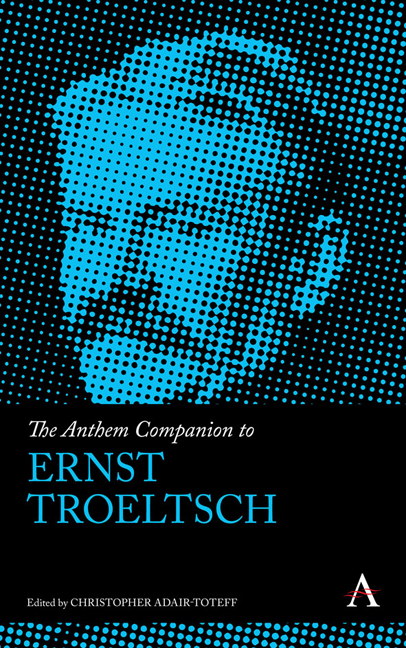Book contents
- Frontmatter
- Contents
- Introduction Ernst Troeltsch: Theologian, Sociologist, Philosopher, and Culture Critic
- Chapter One The Independence of Religious Phenomena: The Work of Ernst Troeltsch as a Template for the Study of Religion
- Chapter Two Troeltsch on Protestantism and Modernity
- Chapter Three Church, Sect, Mysticism: Writing the History of Christianity
- Chapter Four Troeltsch's Personalism
- Chapter Five Performative Practice: Ernst Troeltsch's Concept(s) of Christianity
- Chapter Six Troeltsch and the Problem of Theological Normativity
- Chapter Seven Troeltsch as Dogmatic Theologian
- Chapter Eight Ernst Troeltsch and the Problem of Historicism
- List of Contributors
- Index
Chapter Four - Troeltsch's Personalism
Published online by Cambridge University Press: 10 May 2018
- Frontmatter
- Contents
- Introduction Ernst Troeltsch: Theologian, Sociologist, Philosopher, and Culture Critic
- Chapter One The Independence of Religious Phenomena: The Work of Ernst Troeltsch as a Template for the Study of Religion
- Chapter Two Troeltsch on Protestantism and Modernity
- Chapter Three Church, Sect, Mysticism: Writing the History of Christianity
- Chapter Four Troeltsch's Personalism
- Chapter Five Performative Practice: Ernst Troeltsch's Concept(s) of Christianity
- Chapter Six Troeltsch and the Problem of Theological Normativity
- Chapter Seven Troeltsch as Dogmatic Theologian
- Chapter Eight Ernst Troeltsch and the Problem of Historicism
- List of Contributors
- Index
Summary
In his lectures on dogmatics – published posthumously by Gertrud von Le Fort, and in agreement with Marta Troeltsch, under the title ‘Glaubenslehre’ – the following revealing sentence can be found: ‘Our Glaubenslehre will not exhibit the slightest tendency to monism; it will be personalistic through and through’ (Troeltsch 1991a, 113). This statement, primarily concerning the place of Ernst Troeltsch's work within the contemporary Protestant theology of his time, could also pass as the headline for his entire body of work as a theologian and philosopher, sociologist and theorist of history. The following discussion shows why this is an accurate description. Two questions guide the investigation: What were Troeltsch's reasons for committing to a personalistic conception of faith, ethos, religion, culture and society? And what are the specifics of Troeltsch's personalism, which cannot easily be associated with any of the then current positions? In this chapter, it is shown that the term ‘personalism,’ which is dispersed throughout Troeltsch's whole work, is something like an abbreviation for his historical sociology of religion – of (Protestant) Christianity, to be precise. This allows us to understand the reference to ‘personalism’ as Troeltsch's attempt at answering two questions posed by his expert friend (Fachmenschenfreund) Max Weber in his diagnosis of modernity. They concern the role and task of religion in the present age and the ideal value that – despite all centrifugal forces caused by the assured ‘battle of the gods’ (Weber) and the prevailing ‘anarchy of values’ (Wilhelm Dilthey) – could constitute the foundation of a yet- to- be- created cultural synthesis. This indeed makes Troeltsch a precursor of what the sociologist Hans Joas, for our times and following Troeltsch, has described as the ‘genealogy of human rights,’ which is the rise of the idea of the ‘sacredness of the person’ (Joas 2013).
Against this background, I examine the historical roots of Troeltsch's conception of personalism (1), followed by an outline of the socio- philosophical (2) and religiotheoretical (3) consequences. Finally – after a brief excursus to Weber – I address its historico- philosophical and cultural- ethical aspects (4). This also reveals the prominent role that the theologian Troeltsch assigns to Christianity in all these respects. This perspective illuminates as well the quote from the dogmatics lectures cited above.
A Genealogy of the Person
Troeltsch's thinking is deeply influenced by the rise and crisis of historicism.
- Type
- Chapter
- Information
- The Anthem Companion to Ernst Troeltsch , pp. 71 - 82Publisher: Anthem PressPrint publication year: 2017

